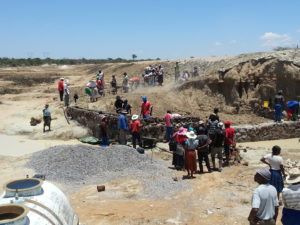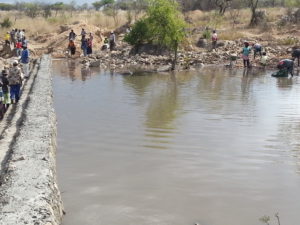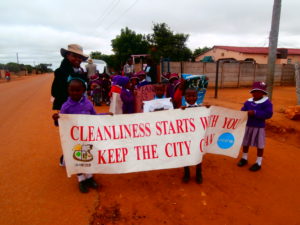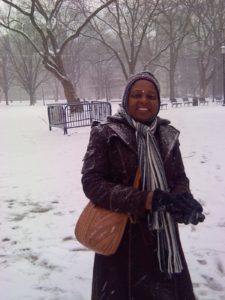IVLP Alumni Spotlight features U.S. Department of State International Visitor Leadership Program (IVLP) alumni as they reflect on the impact of the program and how it has affected their work and lives. Here we feature the Director of Hope for a Child in Christ, a non-profit organisation based in Zimbabwe who participated on the IVLP in 2014. Ms. Sunga Mzeche spent three weeks in the United States visiting non-profit organisations, federal agencies, and corporations to learn about volunteerism and NGO best practices.
Visitor: Ms. Sunga Mzeche
Title: Director, Hope for a Child in Christ (HOCIC)
Country of Origin: Zimbabwe
Itinerary: Washington DC; San Francisco California; Cleveland Ohio; Atlanta Georgia
IVLP Project: Volunteerism in the U.S.: Civic Leadership in Action
Dates: January 18 to February 7, 2014

What have you been up to since your IVLP experience?
My IVLP experience enhanced my leadership skills considerably. When I was nominated for the program, I was the Programs Coordinator of my organization, Hope for a Child in Christ (HOCIC). I have since risen through the ranks to become the Director. In 2016, I was privileged to be selected to be a Mentor in a 6 months U.S. Embassy-sponsored project entitled Women’s Development Dialogue Series (WDD). Forty women were nominated to participate in this project of which 20 women were mentor level, well established successful women and 20 mentee level, young dynamic women. This program encouraged mentorship and professional development and was a platform for networking among the participants through discussing useful topics that are pertinent to women today.
Since my return from the U.S. in February 2014, I have been passionate about community service and inspiring communities to advocate for women and children’s rights. HOCIC works with underprivileged rural communities with the main focus being girls and women. Through the IVLP experience I learned about corporate social responsibility (CSR – companies giving back to the community). Through the Self-Help Group Program that we are running with rural women in Umguza, the women have managed to advocate for access to a health center.

Previously, community members were travelling long distances, up to 40 km, to the nearest health centres with some women giving birth along the way. Through the women’s advocacy efforts, the Rural District Council allocated the community some land to build a clinic. To promote corporate social responsibility amongst companies, we are currently working with the women in approaching companies in their communities to assist with building material to build a clinic in Umguza Ward 8.
The IVLP experience also inspired me to implement Community Work projects that enhance the livelihoods of the community. In 2017, HOCIC implemented the Food Assistance for Assets program (FFA). The objective of the program was for community members to rehabilitate, create and establish assets such as small weir dams, gardens and diptanks that assist in achieving food security in drought prone areas. Communities in rural Matobo actively participated in the planning and construction of the assets. Community members and women’s groups did community work to construct one new diptank, 2 weir dams and 4 nutrition gardens and also attend trainings on crop farming and livestock production to build resilience against future shocks (droughts). 800 people (271 men and 529 women) worked on the assets and at least 6,000 food insecure households are now benefiting from the diptank, gardens and weir dams.
Another project that I am currently working on is focusing on access to safe sanitary wear for rural girls. Due to unaffordable prices for sanitary wear most rural girls and young women resort to using materials like leaves, cow dung and old rags which exposes them to vaginal infections. Some girls even miss school for 5 days a month during their monthly period which affects their school performance. The project is a campaign to source funds to purchase a dignity pack to the girls which will contain 12 months’ supply of sanitary pads, soap, a towel and at least 5 panties for adolescent girls and young women aged 10 to 24 years from rural Zimbabwe. Local companies and other adolescents in urban areas have also been approached to donate sanitary wear in kind.

What one lesson that you learned or idea that you gained on your IVLP experience have you started to apply in your organization or your work.
I learned many lessons: Firstly, I learned that even the underprivileged have something to give and can improve their community and livelihoods through volunteerism, hence programs like the Food for Assets and Women’s Self-Help Groups. I also learned that in the U.S., volunteering cuts across all ages. I have worked with children at pre-school on a clean-up campaign, adolescents performing community service at children’s homes, old people’s homes, juvenile delinquency home anda wildlife orphanage. I have also worked with the elderly/retired in doing community service at orphanages. I also learned that community service is varied; we used to think of visiting and helping out at children’s orphanages and old people’s homes only when conducting community service. But in the U.S., I learned that one can do community service anywhere where there is a need, hence the clean-up campaign in the high density suburb of Emganwini with early childhood development (ECD) children and the clean-up and planting grass and trees for a picnic place at Chipangali Wildlife Orphanage with the young people.
What message would you like to share with the people who hosted and met with you in the U.S.?

There is a high level of professionalism within organisations in the U.S., and they know how to harness funding, resources and the power of the people who are involved. I gained a much deeper understanding of the diversity of American political and social culture which was really interesting, especially through the home stay and hospitality visits in Cleveland and San Francisco, where the hosts were very knowledgeable about the U.S. My perceptions of the U.S. before I went there were changed. I used to see the U.S. as one big country with people who are self-centered. But from the trip, I learned that the U.S. is more like 50 different states /countries, all with different cultures, economies, ethics and laws and that Americans love to serve as volunteers for the benefit of those in need. As a member of a multi-regional program, I also forged long lasting partnerships with colleagues from other countries. I got to learn and understand different religions and cultures. I would like to thank the U.S. Embassy Public Affairs Department in Harare for the opportunity to be on this trip.
The International Visitor Leadership Program is sponsored by the U.S. Department of State with funding provided by the U.S. Government and supported in its implementation by Meridian International Center.
















